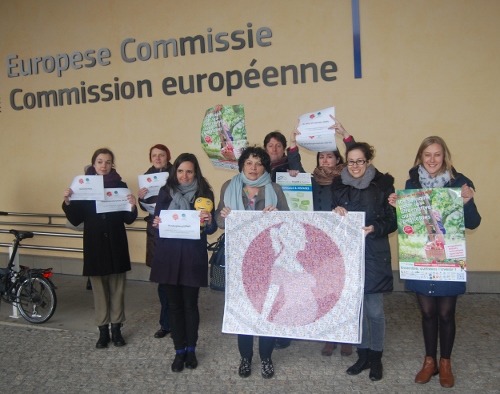Health and Environment Alliance press release: Mums and parents-to-be call for reductions in pesticide use
http://www.env-health.org/resources/press-releases/article/media-advisor...
10th Anniversary of Pesticides Action Week, 20-30 March 2015
Brussels, 25 March 2015 – Sophie Bordères, coordinator of Pesticides Action Week (1), says she has residues of pesticides in her body that should not be there.
In Brussels as part of Pesticides Action Week, she took part in an action with mothers, young women, men, babies, banners and bikes outside the European Commission building at Schuman. The event was co-organised in Brussels in partnership with the Health and Environment Alliance (HEAL).
Earlier this month, Ms Bordères discovered the pesticides contained in her body. She had taken part in a study in which a sample of her hair was analysed by the French association, Génerations Futures (2). Seven endocrine disrupting pesticides were found in all the hair samples of the 28 women participants in the study (the chemical substances are displayed on posters held up by those taking part in the action). She says that making known these findings can help raise awareness of the health and environmental dangers of pesticides, which is one of the key aims of Pesticides Action Week. (3)
“Traces of several insecticides that are endocrine disrupters were found in a sample of my hair, including pyrethroids and organophosphates (4),” she says.
The study provided more evidence of widespread human contamination with synthetic chemicals. For those women who plan to become pregnant, the risks are a special concern for the vulnerable fetus in the womb.
Confirmation that the traces of one of the pesticides found in Ms Bordères’s body is considered harmful was very recently underlined by an announcement from the UN’s international cancer research agency (IARC). (5)
Lisette van Vliet, HEAL’s Senior Policy Advisor on Chemicals and Chronic Disease Prevention, says :
_ “Just last week the International Agency for Research on Cancer classified some of these pesticides as probable carcinogens. So the continual increase in hormone-related diseases, such as cancers of the breast and prostate and diabetes, is not an empty coincidence. We call on the European Commission and EU member countries to protect people’s health by phasing out endocrine disrupting chemicals as soon as possible. This includes the widely used organophosphate pesticide, glyphosate, known by its brand name, Roundup.”
Another study published in March estimated the health bill associated with exposure to endocrine disrupting pesticides at €120 billion per year in the European Union. (6)
Lisette van Vliet, HEAL says that parents need information about the risks. The Danish government already provides women in the reproductive age group with advice on exposure to chemicals (7) but most countries do not. “The European Union should be helping all member state governments to provide this information for future and current parents,” she says.
Meanwhile, HEAL has developed a list of available written and visual materials in different European languages. (8)
Although information is vital, EU policy change is what will significantly minimise human exposure and bring down levels of synthetic chemicals and pesticides in European’s bodies. The 2009 pesticide package included a ban on the sale and use of pesticides that are linked with cancer, DNA mutation or reproductive toxicity and encouraged reductions in pesticide spraying in public spaces, such as parks and around schools and hospitals. However, the legislation required that the European Commission define criteria on endocrine disrupting chemicals if the package were to be fully implemented. Although this was supposed to happen by 2013, it still has not been done. (9)
Europeans’ concerns about chemicals were reflected in a Eurobarometer poll published in September 2014. It showed four in ten Europeans worry about the impact of chemicals on their health. (10)
*Metabolites are the products of metabolism and are formed from the ‘parent’ chemical compounds as part of the biochemical process of degrading the compounds. Metabolites are formed in human or animal bodies, or via industrial microbiological processes.
Contacts:
Lisette van Vliet, Senior Policy Adviser, Health and Environment Alliance (HEAL), Mobile: +32 484 614 528. Email: lisette@env-health.org
Sophie Bordères, Coordinator, Pesticides Action Week, Mobile: + 33 6 45 48 13 54 Email: semainesanspesticide@free.fr
Diana Smith, HEAL Communications and Media Adviser, diana@env-health.org, mobile: +33 6 33 04 2943

Notes for Journalists 1. Pesticides Action Week, http://env-health.org/news/latest-news/article/pesticide-action-week-2015 and www.pesticideactionweek.org
2. The study involved 28 women living in the Ile de France (greater Paris), see http://www.env-health.org/resources/press-releases/article/nineteen-endocrine-disrupting Full report: http://www.generations-futures.fr/perturbateurs-endocriniens/exppert-4 (In French)
3. The campaign also promotes alternatives to pesticides, such as organic farming, and the designation of “pesticide free” areas. A local referendum in Italy voted overwhelmingly in favour of the commune going “pesticide free”. See letters from Malles Venosta in “Voices of pesticides around Europe” at http://www.pan-europe.info/Issues/Voices/
4. Pyrethroids are widely used on cereals being stored as grains and for killing aphids on roses. Six organophosphates remain on the market today but many have already been banned.
5. Lancet Oncology, Carcinogenicity of tetrachlorvinphos, parathion, malathion, diazinon, and glyphosate, 20 March 2015, http://www.thelancet.com/journals/lanonc/article/PIIS1470-2045(15)70134-8/abstract (Metabolites of parathion were found in Ms Borderes’ body)
6. This finding is from a recent study published in Journal of Clinical Endocrinology and Metabolism, Endocrine Society see http://www.ncbi.nlm.nih.gov/pubmed/25742516 and displayed in an associated infographic
Although many organophosphates are banned in the EU, about six are still widely used, including glyphosate.
7. Danish Environment Protection Agency (EPA) Expecting a baby? Advice about chemicals and pregnancy (2014) Available in English, Danish
8. HEAL resource list on pregnancy and EDCs is available here http://env-health.org/IMG/pdf/20032015_paw__edcs_pesticides_and_pregnancy_final.pdf
9. The change is resisted by the agro-chemical industry. Listen to the European Parliament, “Europe and You” online debate, between Lisette van Vliet, HEAL and a representative from the UK National Union of Farmers (NFU), 4 Feb 2015 www.youtube.com/europeandyou 3.24-13.32 minutes
10. Eurobarometer, September 2014, Attitudes of European citizens towards the environment, http://ec.europa.eu/public_opinion/archives/ebs/ebs_416_en.pdf
